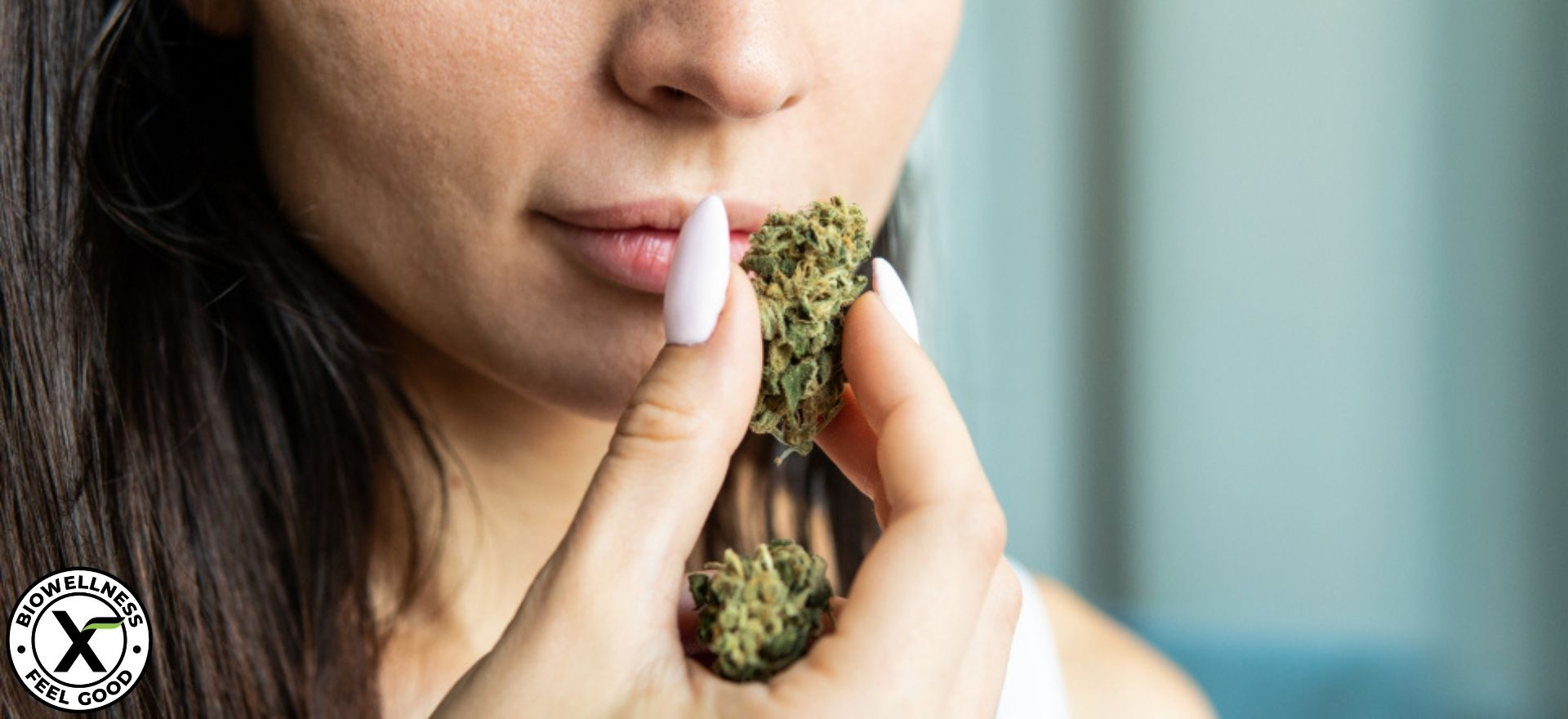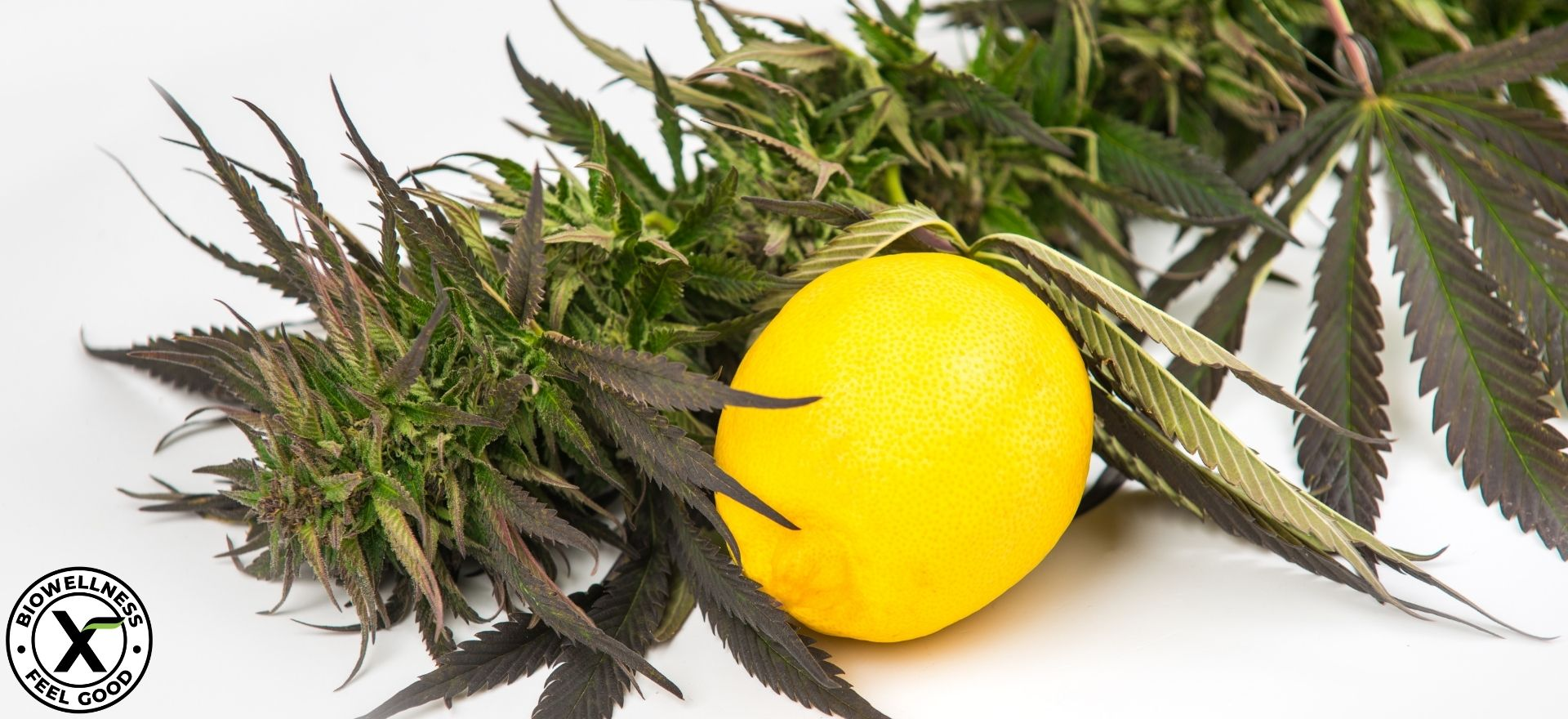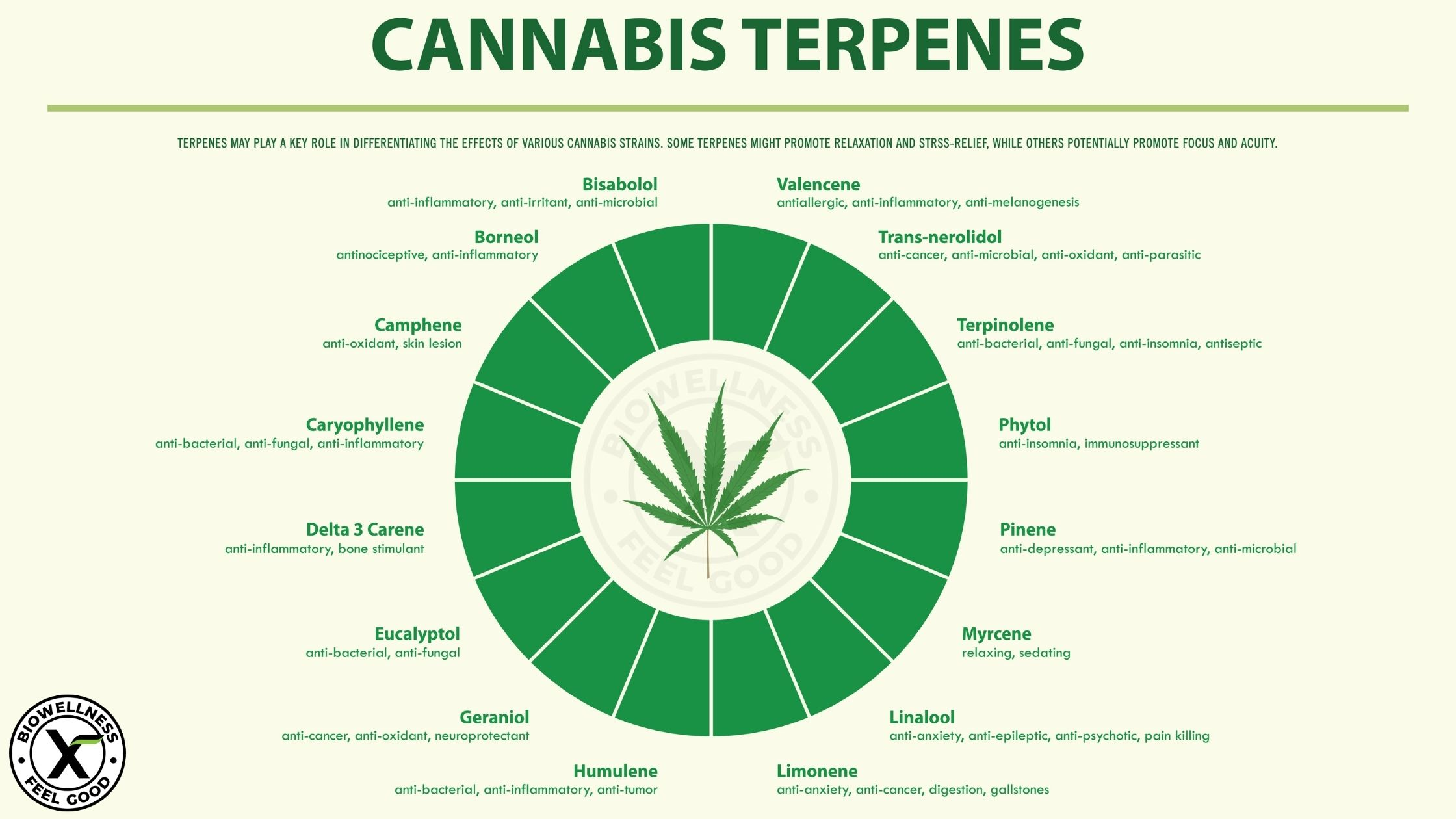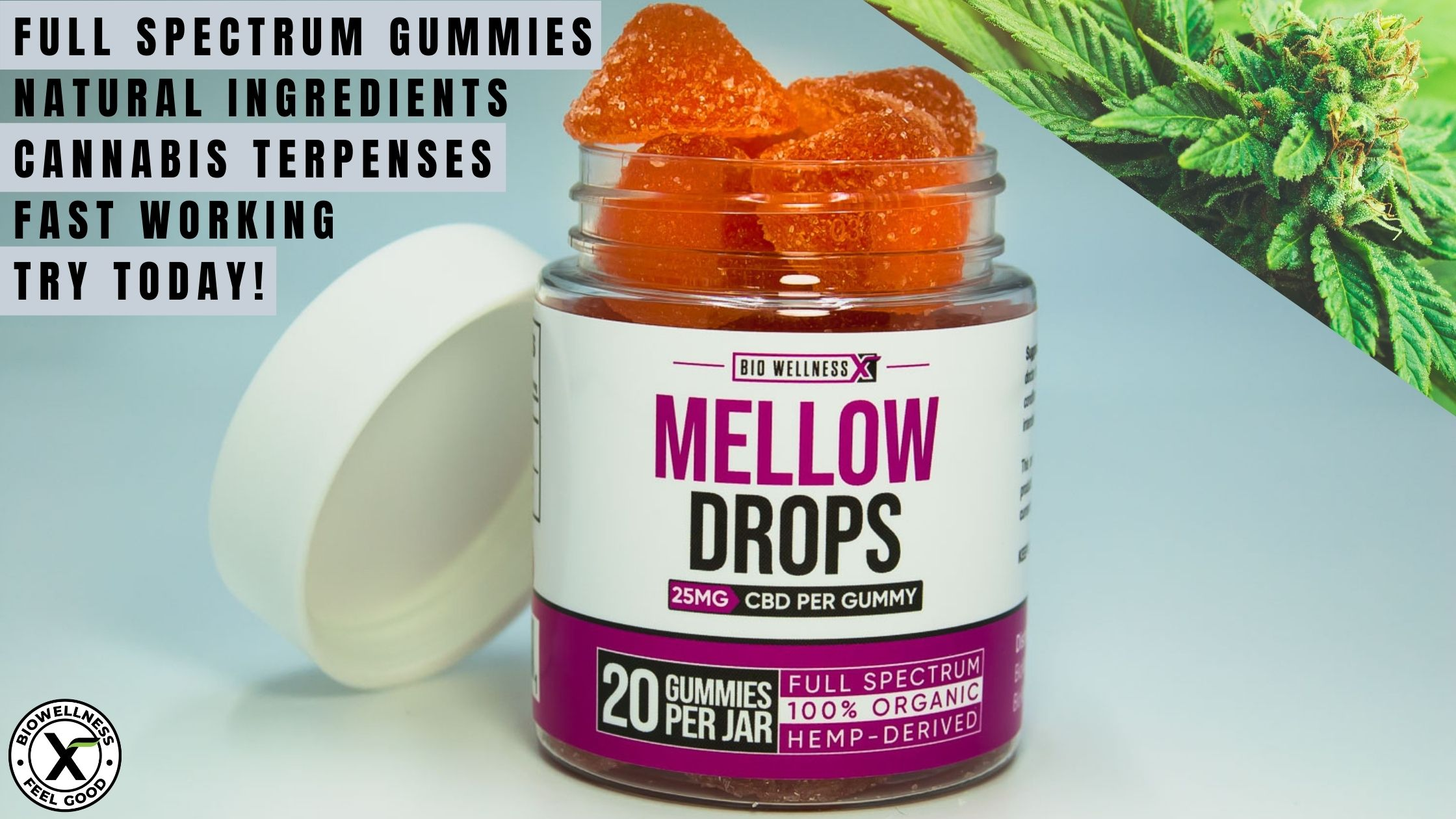key points
If you have ever wondered why two strains with the same THC and CBD content have different smells, tastes, and produce different feelings of being high, you’ll want to know about cannabis-derived terpenes.
As a cannabis user, you probably have discovered that you have a favorite flavor and smell of the products you purchase. These distinct aromas and tastes are a result of a compound called terpenes.[1]
Terpenes are organic substances that give plants their particular palate and scent. The taste and smell can range from fruity to peppery to pine, and more- all depending on the terpene content.
But terpenes can do more than determine the flavor and aroma of live plants like cannabis. Terpenes also provide therapeutic benefits.
In this article, we break down what to know about these little-known compounds that make cannabis a better experience.
What Are Terpenes And What Do They Do?
Terpenes are naturally occurring compounds that are produced by all living plants. Different terpenes are responsible for the unique smells and tastes in all plants and fruits.
Terpenes have other beneficial characteristics for living plants:
- Attract pollinators
- Protect plants by repelling predators
- Help plants recover from damage
Most importantly, terpenes can have benefits for all of us in our daily lives.
A terpene profile is classified into one of three groups based on the source. Each has its advantages and disadvantages and provides different results.
- Cannabis-derived terpenes (CDT)
- Botanical or plant-derived terpenes*
- Synthetic terpenes*
*Non-cannabis-derived terpenes.
We’ll break down each of these groups below so you know what the difference is, and which to go with.
How Do Terpenes Affect The Body?
Much of the research into the way terpenes affect us is preliminary, but indications point to both physical and psychological benefits. Early studies have found a range of therapeutic benefits associated with terpenes.[2]
Some terpenes may promote a state of relaxation and potentially provide sleep support. Others have potential benefits for helping to manage symptoms of stress.[3] And yet others can energize you like those from the cannabis Sativa plant. All cannabinoid receptors interact differently in the body.
In the area of cannabis, emerging evidence suggests that the terpene plant compounds work together synergistically in the body and help boost the effects of cannabinoids.[4]. This is known as the entourage effect.[5]
Terpenes and the Entourage Effect
The entourage effect occurs when all compounds present in cannabis are “more together than the sum of its parts.”
In other words, the best results occur when cannabinoids and individual terpenes are consumed together, instead of on their own. This is where some of the greatest medicinal benefits are seen.
Remember, your physical and mental state, your expectations, and your past cannabis experiences will also influence how your body and mind react to terpenes.
Can Terpenes Get You High?
Unlike cannabinoids, terpenes on their own do not create a psychoactive state or feeling of getting high. Instead, terpenes can impact how cannabis functions.
This is again, the entourage effect. It occurs when a combination of cannabinoids and terpenes delivers stronger effects than any cannabinoid or individual terpene alone. The sum is more effective than the parts.

Natural Terpenes vs. Synthetic terpenes
The distinction between natural and synthetic terpenes is actually pretty simple.
- Natural terpenes are extracted straight from botanical sources like plants and whole foods. However “naturally derived terpenes” may refer to both non-cannabis-derived terpenes
as well as cannabis-derived terpenes. For example, you find limonene terpene in lemons, pinene in pine, and citronellal terpene in oranges. - Synthetic terpenes are produced in a lab by manipulating and blending chemicals to mirror the specific terpenes. These terpenes do not come from Mother Nature.
Think of this as eating an actual orange versus orange flavoring.
The Impact of Production Costs
It should come as no surprise that cost plays a factor in whether a manufacturing company uses natural or synthetic terpenes.
Since live plants only contain a small number of terpenes, a large number of natural materials are needed to produce the necessary amount of terpenes. So, it is fairly expensive to use and extract terpenes from live plants.
The cost of a synthetic version can be more cost-effective. That’s because this artificial method that attempts to simulate the same flavors and aromas can be better controlled and manipulated.
Take the time to check whether your cannabinoid product contains botanical or synthetic terpenes to assure you receive all the advantages of terpenes derived directly from the cannabis plant.
Botanical Terpenes: What Are They?
Botanical-derived terpenes are sourced from non-cannabis plants. They are also known as non-cannabis-derived terpenes.
The term “botanical terpenes” can also be called “plant-derived terpenes.” On their own, these non-cannabis-derived terpenes have no psychoactive effects.
The Benefits of Botanical Terpenes
Once extracted, terpenes create a variety of sensorial and therapeutic experiences. When terpenes are optimized, they can support a variety of health benefits.
Since botanical terpenes are not sourced from cannabis plants (non-cannabis-derived terpenes), they are legal, eliminating any concerns you may have about using them.
Synthetic Terpenes: What Are They?
Recently, some companies have created synthetic versions of terpenes that grow naturally. These synthetic versions are not sourced from live plants. Rather, these terpenes are made in a lab with chemical ingredients.
Unfortunately, when terpenes are obtained synthetically, may have entirely different chemical structures than their natural counterparts. This may affect how non-cannabis-derived terpenes act in your body. Non-terpene elements vs cannabis-derived terpenes can act differently in the body.
The Benefits of Synthetic Terpenes
Extractors most commonly produce synthetic compounds through processes such as dilution, redistilling, and reconstruction.
Since the chemical makeup is controlled in synthetic terpenes, the smells and flavors may be more intense for a more pleasing aroma -similar to essential oils.
Side-Effects of Synthetic Terpenes
Some professionals have questions regarding the safety of synthetic forms. Your body may react differently to the chemicals and intensity of synthetic types compared to natural, botanical, or cannabis terpenes.
Cannabis-Derived Terpenes: What Are They?
Cannabis-derived terpenes (CDT) are exactly like they sound. They are terpenes extracted exclusively and strictly from cannabis plants. They are the most natural source for cannabis-based products and the majority of research is based on CDT.
In addition, published research confirms that terpenes are responsible for the aroma and flavor characteristics of cannabis.[6] Different terpene profiles give cannabis strains different odors and tastes as well as therapeutic benefits.

The Benefits of Cannabis-Derived Terpenes
Both botanical and CDT terpenes are naturally derived from plant sources. Most experts in the cannabis industry believe that CDT should be your preferred choice. That’s because cannabis-derived terpenes are formulated by pulling nutrients directly from the earth and are not created in a laboratory.
Although both botanical and cannabis-derived terpenes are basically the same isolated terpenes, utilizing CDT allows for a more natural “entourage effect,” which we mentioned earlier.[7] The entourage effect maximizes the effects of cannabinoids.
The Costs of Cannabis-Derived Terpenes
Cannabis-derived terpenes are more complicated and expensive to extract, but they deliver the best experience. One liter of real Cannabis-derived terpenes can easily cost upwards of $10,000!
Cannabis is already pricey. It would be cheaper to add back the botanically extracted terpenes at the end of the extraction process. But it would also likely be less effective in delivering the flavor, aroma, and therapeutic advantages of the individual terpene from the whole plant.
When you’re looking for high-quality cannabis products, choosing products with terpenes that occur naturally in cannabis is a smart decision.
Side-Effects of Cannabis-Derived Terpenes
Cannabis-derived terpenes are generally safe. However, in their pure, concentrated form, they may lead to irritations and allergic reactions when they come into contact with the skin and eyes. Always read the label of the products you purchase.

The Most Common Cannabis-Derived Terpenes
Terpenes give the various cannabis strains their distinctive taste and smell. There are literally hundreds of different terpenes found in cannabis plants, which is much more than in other plants.[8]
Borneol
Aroma & Taste: Naturally found in ginger, rosemary, camphor, and thyme, Borneol is a common terpene found in cannabis. Its distinct aroma is similar to camphor or menthol.
Potential Therapeutic Benefits: Borneol has been used in Traditional Chinese Medicine for centuries. Early research finds that it may have therapeutic benefits including helping promote healthy digestion and blood circulation. [9],[10]
Bisabolol
Aroma & Taste: This terpene exists in small quantities in most strains so it plays only a minor role in flavor and fragrance. Found primarily in chamomile, bisabolol has a warm, fragrant floral aroma.
Potential Therapeutic Benefits: In animal studies, bisabolol was found to promote healthy digestion and provide support for dealing with skin inflammation, among other health benefits.[11],[12]
Caryophyllene
Aroma & Taste: Not only is beta-caryophyllene one of the primary compounds in cannabis, but it is also found in culinary herbs and spices including black pepper, cinnamon, and clove oil. Also referred to as caryophyllene, or simply BCP, this terpene produces a woodsy, spicy scent.
Potential Therapeutic Benefits: Emerging research suggests that beta-caryophyllene plays a major role in the entourage effect. When paired with cannabis, it may help support a healthy mood, help with overall discomfort, and promote brain health.[13],[14],[15]
Camphene
Aroma & Taste: Camphene gives off a unique smell. Its pungent, musky, earthy scent has piney undertones.
Potential Therapeutic Benefits: With a rich history of traditional use, camphene contains antioxidant properties which can help reduce the oxidative stress that can lead to tissue damage. [16], It may also help manage pain and discomfort as well as offer several health benefits.[17][18]
Eucalyptol
Aroma & Taste: Naturally produced by the Eucalyptus tree, eucalyptol is also found in rosemary. It is well-known for its minty and cooling distinctive aroma.
Potential Therapeutic Benefits: You may know this terpene for its common use for sinus and nasal congestion. In addition, initial research reveals eucalyptol may support respiratory health, have a positive effect on anxiety, and may promote cognitive health. [19],[20], [21]
Humulene
Aroma & Taste: Extracted from the hops plant, humulene brings together the flavor and smells of marijuana and beer.
Potential Therapeutic Benefits: When it comes to cannabis, Humulene is mostly found in sativa cannabis strains that may promote energy levels and a creative high sensation. Its preliminary health benefits suggest it is most popular for managing inflammation and weight.[22]
Limonene
Aroma & Taste: This terpene with its sweet, zesty, and citrusy odor is found in everyday items including cosmetics and cleaning products.
Potential Therapeutic Benefits: A published study found that limonene may support a healthy mood. This occurs because the lemon oil increased the activity of serotonin, dopamine, and norepinephrine to help elevate your outlook.[23] Some early studies on limonene also show potential for stress relief and gastrointestinal support.[24],[25]
Myrcene
Aroma & Taste: The most common terpene found in the cannabis Sativa plant is myrcene. Myrcene is found in the hops of your beer and gives cannabis a distinct peppery, spicy, balsam signature aroma.
Potential Therapeutic Benefits: Myrcene is known to amplify the effects of cannabinoids, especially in calming the mind and body.[26] In addition, myrcene may act as an anti-inflammatory while also supporting joint health.[27]
Early research demonstrates that myrcene may allow the blood-brain barrier to become more penetrable for THCf for more potent psychoactive effects. In this way, myrcene may be a terpene that can maximize your high.
Nerolidol
Aroma & Taste: This terpene offers a fresh, forest scent of rose and citrus.
Potential Therapeutic Benefits: Similar to other terpenes, nerolidol research shows promise in various areas that may benefit our health and well-being.[28] This includes supporting a healthy immune system and promoting a feeling of calm.[29],[30]
Ocimene
Aroma & Taste: Ocimene is responsible for the sweet flavors associated with a certain cannabis strain. It is also found in non-cannabis flowers like mint and parsley.
Potential Therapeutic Benefits: Initial research points to ocimene as a potential terpene with anti-inflammation and anti-fungal medicinal properties.[31],[32]
Alpha-Pinene
Aroma & Taste: One of the most common cannabis-derived terpenes found in a cannabis plant is Pinene. It will remind you of a hike in the forest with its sharp but sweet fresh piney scent, similar to pine trees. A very commonly desired essential oils scent and prevalent terpenes.
Potential Therapeutic Benefits: Pinene may support a healthy mood as well as promote cognitive function and memory, as well as feelings of alertness and focus.[33],[34]

Do Terpenes Have Medicinal Benefits?
Much of the research on terpenes is still in its infancy. Many, however, have therapeutic advantages to consider.
Terpenes for Sleep Aid
To enjoy a good night’s sleep without the use of prescription drugs and their unwanted side effects, consider terpenes. Myrene and caryophyllene appear to have relaxing characteristics to provide sleep support, which are beneficial compounds.
When it’s time to wind down for the night these two terpenes can help conquer the stress and promote calmness, making it easier to fall and stay asleep. Combining them into a cannabis product will help you enjoy a restful night.
Terpenes for Energy, Focus, and Anti-Anxiety
Pinene and limonene may help when they synergistically work with the cannabis plant.
Pinene is supported by research to improve cognitive function and memory as well as reduce the symptoms of anxiety.
And studies have shown promise in limonene’s ability to relieve stress and elevate your mood.[35] This, in turn, may help boost your energy level.
Terpenes for Discomfort
Consider humulene to help manage inflammatory discomfort.[36]And the terpenes myrcene, pinene, limonene, and caryophyllene have been researched for their benefits when you experience inflammation and pain.[37],[38],[39],[40]
Does Delta-8 Have Terpenes?
The presence of terpenes in Delta-8 concentrates is a topic of significant debate.
The majority of “terped” or terpene-infused Delta-8 most likely had terpenes added after the CBD was converted. Many Delta-8 products contain some of the same terpenes that are commonly found in traditional weed, such as myrcene, limonene, and linalool; however, this is not usually the consequence of turning CBD obtained from hemp into Delta-8.
Many smokable Delta-8 products contain terpenes because they enhance the effects of Delta-8, which is why they are included. For instance, limonene is frequently used for its lemony scent and anti-inflammatory qualities. In contrast, myrcene is known for its anxiolytic effects and earthy perfume—the psychedelic properties of Delta-8, which cause users to feel both ecstatic and energized.
Final Thoughts: 2025 Guide to Cannabis Terpenes
Terpenes are aromatic compounds found in live plants, not just marijuana. However, terpenes are most commonly associated with the cannabis plant.
At BioWellnessX we choose to use cannabis-derived terpenes from natural sources. We believe this decision delivers the best and safest experience available. Visit our website to learn more about how our wide range of quality products can support your physical and mental health.

LEGAL DISCLAIMER
By reading this legal information, you agree to release the author of any liability related to or arising from your use of this data. This post contains no legal advice. The legal status surrounding Delta 8 THC, Delta 9 THC & Delta 10 THC is new and constantly changing. We continuously work hard to do our best to give you the most updated information. We recommend that you always check your current state’s laws or federal hemp laws before purchasing a hemp product (CBD, THC). The data in this post is not intended to diagnose, treat, cure or give any medical advice. Do your due diligence and always consult your health care practitioner’s advice, especially if you are in doubt or are currently taking any prescription medications. Safer than sorry is always a great idea when consuming new products.
References:
- https://www.ncbi.nlm.nih.gov/pmc/articles/PMC7763918/
- https://link.springer.com/chapter/10.1007/978-3-030-31269-5_15
- https://www.ncbi.nlm.nih.gov/pmc/articles/PMC7324885/
- https://www.sciencedirect.com/science/article/abs/pii/S0014299998003926
- https://www.nature.com/articles/s41598-021-87740-8
- https://www.ncbi.nlm.nih.gov/pmc/articles/PMC7763918/
- https://www.ncbi.nlm.nih.gov/pmc/articles/PMC6334252/
- https://www.ncbi.nlm.nih.gov/pmc/articles/PMC3165946/
- https://physoc.onlinelibrary.wiley.com/doi/pdf/10.1113/jphysiol.1888.sp000276
- https://pubmed.ncbi.nlm.nih.gov/23700426/
- https://pubmed.ncbi.nlm.nih.gov/29243833/
- https://pubmed.ncbi.nlm.nih.gov/24894548/
- https://pubmed.ncbi.nlm.nih.gov/24930711/
- https://pubmed.ncbi.nlm.nih.gov/24210682/
- https://pubmed.ncbi.nlm.nih.gov/25171128/
- https://www.ncbi.nlm.nih.gov/pmc/articles/PMC7179440/
- https://pubmed.ncbi.nlm.nih.gov/23724298/
- https://www.ncbi.nlm.nih.gov/pmc/articles/PMC6270224/
- https://pubmed.ncbi.nlm.nih.gov/12645832/
- https://pubmed.ncbi.nlm.nih.gov/25028591/
- https://link.springer.com/article/10.1007/s11064-013-1231-9
- https://pubmed.ncbi.nlm.nih.gov/17559833/
- https://www.sciencedirect.com/science/article/pii/S1756464612001740
- https://www.ncbi.nlm.nih.gov/pmc/articles/PMC3598547/
- https://pubmed.ncbi.nlm.nih.gov/18072821/
- https://www.ncbi.nlm.nih.gov/pmc/articles/PMC7324885/
- https://pubmed.ncbi.nlm.nih.gov/25622554/
- https://www.researchgate.net/publication/301715588Nerolidol_A_Sesquiterpene_Alcohol_Multi-Faceted_Pharmacological_and_Biological_Activities
- https://www.ncbi.nlm.nih.gov/pmc/articles/PMC201169/
- https://pubmed.ncbi.nlm.nih.gov/23765368/
- https://pubmed.ncbi.nlm.nih.gov/26114148/
- https://pubmed.ncbi.nlm.nih.gov/25026734/
- https://www.ncbi.nlm.nih.gov/pmc/articles/PMC7324885/
- https://www.ncbi.nlm.nih.gov/pmc/articles/PMC3165946/
- https://pubmed.ncbi.nlm.nih.gov/18072821/
- https://www.tandfonline.com/doi/full/10.1517/13543776.2014.870154
- https://pubmed.ncbi.nlm.nih.gov/26584457/
- https://www.ncbi.nlm.nih.gov/pmc/articles/PMC6920849/
- https://pubmed.ncbi.nlm.nih.gov/28673718/
- https://pubmed.ncbi.nlm.nih.gov/24210682/
- https://www.sciencedirect.com/science/article/abs/pii/S0223523418306408
FAQs About Cannabis Terpenes
Terpenes are the compounds responsible for the aroma and flavors in most plants. They are found in most live plants, fruits, herbs and are abundant in a cannabis plant too. Terpenes may also offer therapeutic effects.
Terpenes’ therapeutic properties are supported by published research. These studies suggest that terpenes have anti-inflammatory, antioxidant, calming, analgesic, antidepressant, and neuroprotective, attributes, among others.[41]
Terpenes are generally safe with few side effects. However, in their pure, concentrated form, they may lead to irritations and allergic reactions when they come into contact with skin and eyes. Always read the label of the products you purchase.
Terpenes are used to create the flavors and scents of many products. This includes fragrances, skincare, foods, and cannabis items. They got popular after studies found them in the cannabis plant.
In general, terpenes are legal on their own. However, when sourced from cannabis, they may be illegal under federal law and laws in certain areas. In other words, cannabis-derived terpenes operate in a legal gray area. The 2018 Farm Bill legalized hemp, including hemp-derived CBD and terpenes. In addition, some states have legalized cannabis and its terpenes, but always check to understand the regulations in your state.







